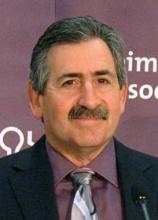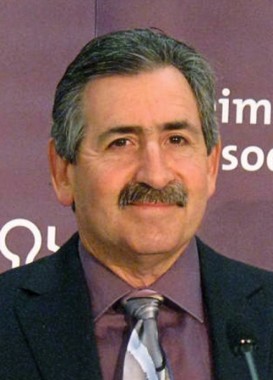User login
BOSTON – Patients with mild cognitive impairment had significant improvement in both executive function and verbal memory when they were treated with CHF5074, an experimental gamma-secretase modulator that investigators claim has the potential to partially restore the brain’s innate immune response, investigators reported at Alzheimer’s Association International Conference 2013.
Among 32 patients with mild cognitive impairment (MCI) who reached 64 weeks of follow-up in an open-label extension of a double-blind, placebo-controlled trial, CHF5074 was associated with significant improvement over baseline in the Digital Symbol Substitution Test (P less than .001), Trail-Making Tests A and B (P = .002 and .004, respectively), Immediate Word Recall (P =.001), and Delayed Word Recall (P = .003), said co–principal investigator Dr. Joel Ross of the Memory Enhancement Center of America in Eatontown, N.J.
Carriers of either one or two copies of the apolipoprotein E epsilon-4 (APOE epsilon-4) allele, who are at increased risk for early-onset Alzheimer’s disease (AD), had significantly greater improvements than did noncarriers in both word recall and trail-making tests.
"We think that this medication may be a start, the first step – perhaps a baby step – in preventing the memory loss that of course is the classic hallmark that Dr. Alzheimer described in the early 1900s," Dr. Ross said at a media briefing held several days prior to the presentation of his data.
Microglia, macrophages that serve as the primary active immune response mechanism of the brain, can malfunction in the presence of beta-amyloid (A-beta) protein, releasing inflammatory cytokines such as tumor necrosis factor–alpha (TNF-alpha), which in turn can cause irreversible neural damage.
CHF5074 (1-(3\',4\'-dichloro-2-fluoro[1,1\'-biphenyl]-4-yl)-cyclopropanecarboxylic acid is a small molecule modulator of the gamma-secretase enzymatic complex involved in A-beta formation, which is believed by many to be the hallmark pathologic event of AD.
According to CHF5074’s developer, the compound does not have the anticyclooxygenase (COX) or Notch-interfering properties seen with some gamma-secretase inhibitors (JPET 2007;323:822-30). The drug has been shown to lower cerebrospinal fluid levels of both soluble CD40 ligand and TNF-alpha, which are markers of neuroinflammation.
"That’s the big selling point for gamma-secretase modulators – that they shift the types of A-betas that are produced without affecting COX, without affecting Notch signaling," said Michael Wolfe, Ph.D., professor of neurology at Harvard Medical School and Brigham and Women’s Hospital, both in Boston. Dr. Wolfe, who studies gamma-secretase pathology in dementias, was not involved in the study.
But whether the drug is actually having an effect on microglia is less clear, he said.
"That doesn’t make any sense to me, based on the molecular mechanism," Dr. Wolfe said in an interview.
CHF5074 was evaluated for safety, tolerability, and efficacy in a 14-week trial of 96 patients with MCI who were enrolled in one of three dose regimens (200, 400, or 600 mg daily). Of this group, 74 enrolled in an open-label extension phase, and 32 were available for evaluation after 64 weeks.
An interim analysis of the cognitive tests in this subgroup showed significant improvement over baseline in domains of both verbal recall and executive function, as noted before.
Fourteen patients dropped out of the study at week 40, including 2 patients in the 600-mg/day group because of worsening cognitive function and serum creatinine elevation, and 1 patient in the 400-mg group because of pneumonia.
Gastrointestinal disorders were the most frequent treatment-emergent adverse events, with diarrhea occurring in 16% of patients on the 600-mg dose, 6.3% of those on 400 mg, and 1.4% on 200 mg.
The study was sponsored by Chiesi Pharmaceuticals. Dr. Ross heads the contract research organization that conducted the study. He did not disclose whether he has additional conflicts of interest. Dr. Wolfe reported having nor relevant disclosures.
BOSTON – Patients with mild cognitive impairment had significant improvement in both executive function and verbal memory when they were treated with CHF5074, an experimental gamma-secretase modulator that investigators claim has the potential to partially restore the brain’s innate immune response, investigators reported at Alzheimer’s Association International Conference 2013.
Among 32 patients with mild cognitive impairment (MCI) who reached 64 weeks of follow-up in an open-label extension of a double-blind, placebo-controlled trial, CHF5074 was associated with significant improvement over baseline in the Digital Symbol Substitution Test (P less than .001), Trail-Making Tests A and B (P = .002 and .004, respectively), Immediate Word Recall (P =.001), and Delayed Word Recall (P = .003), said co–principal investigator Dr. Joel Ross of the Memory Enhancement Center of America in Eatontown, N.J.
Carriers of either one or two copies of the apolipoprotein E epsilon-4 (APOE epsilon-4) allele, who are at increased risk for early-onset Alzheimer’s disease (AD), had significantly greater improvements than did noncarriers in both word recall and trail-making tests.
"We think that this medication may be a start, the first step – perhaps a baby step – in preventing the memory loss that of course is the classic hallmark that Dr. Alzheimer described in the early 1900s," Dr. Ross said at a media briefing held several days prior to the presentation of his data.
Microglia, macrophages that serve as the primary active immune response mechanism of the brain, can malfunction in the presence of beta-amyloid (A-beta) protein, releasing inflammatory cytokines such as tumor necrosis factor–alpha (TNF-alpha), which in turn can cause irreversible neural damage.
CHF5074 (1-(3\',4\'-dichloro-2-fluoro[1,1\'-biphenyl]-4-yl)-cyclopropanecarboxylic acid is a small molecule modulator of the gamma-secretase enzymatic complex involved in A-beta formation, which is believed by many to be the hallmark pathologic event of AD.
According to CHF5074’s developer, the compound does not have the anticyclooxygenase (COX) or Notch-interfering properties seen with some gamma-secretase inhibitors (JPET 2007;323:822-30). The drug has been shown to lower cerebrospinal fluid levels of both soluble CD40 ligand and TNF-alpha, which are markers of neuroinflammation.
"That’s the big selling point for gamma-secretase modulators – that they shift the types of A-betas that are produced without affecting COX, without affecting Notch signaling," said Michael Wolfe, Ph.D., professor of neurology at Harvard Medical School and Brigham and Women’s Hospital, both in Boston. Dr. Wolfe, who studies gamma-secretase pathology in dementias, was not involved in the study.
But whether the drug is actually having an effect on microglia is less clear, he said.
"That doesn’t make any sense to me, based on the molecular mechanism," Dr. Wolfe said in an interview.
CHF5074 was evaluated for safety, tolerability, and efficacy in a 14-week trial of 96 patients with MCI who were enrolled in one of three dose regimens (200, 400, or 600 mg daily). Of this group, 74 enrolled in an open-label extension phase, and 32 were available for evaluation after 64 weeks.
An interim analysis of the cognitive tests in this subgroup showed significant improvement over baseline in domains of both verbal recall and executive function, as noted before.
Fourteen patients dropped out of the study at week 40, including 2 patients in the 600-mg/day group because of worsening cognitive function and serum creatinine elevation, and 1 patient in the 400-mg group because of pneumonia.
Gastrointestinal disorders were the most frequent treatment-emergent adverse events, with diarrhea occurring in 16% of patients on the 600-mg dose, 6.3% of those on 400 mg, and 1.4% on 200 mg.
The study was sponsored by Chiesi Pharmaceuticals. Dr. Ross heads the contract research organization that conducted the study. He did not disclose whether he has additional conflicts of interest. Dr. Wolfe reported having nor relevant disclosures.
BOSTON – Patients with mild cognitive impairment had significant improvement in both executive function and verbal memory when they were treated with CHF5074, an experimental gamma-secretase modulator that investigators claim has the potential to partially restore the brain’s innate immune response, investigators reported at Alzheimer’s Association International Conference 2013.
Among 32 patients with mild cognitive impairment (MCI) who reached 64 weeks of follow-up in an open-label extension of a double-blind, placebo-controlled trial, CHF5074 was associated with significant improvement over baseline in the Digital Symbol Substitution Test (P less than .001), Trail-Making Tests A and B (P = .002 and .004, respectively), Immediate Word Recall (P =.001), and Delayed Word Recall (P = .003), said co–principal investigator Dr. Joel Ross of the Memory Enhancement Center of America in Eatontown, N.J.
Carriers of either one or two copies of the apolipoprotein E epsilon-4 (APOE epsilon-4) allele, who are at increased risk for early-onset Alzheimer’s disease (AD), had significantly greater improvements than did noncarriers in both word recall and trail-making tests.
"We think that this medication may be a start, the first step – perhaps a baby step – in preventing the memory loss that of course is the classic hallmark that Dr. Alzheimer described in the early 1900s," Dr. Ross said at a media briefing held several days prior to the presentation of his data.
Microglia, macrophages that serve as the primary active immune response mechanism of the brain, can malfunction in the presence of beta-amyloid (A-beta) protein, releasing inflammatory cytokines such as tumor necrosis factor–alpha (TNF-alpha), which in turn can cause irreversible neural damage.
CHF5074 (1-(3\',4\'-dichloro-2-fluoro[1,1\'-biphenyl]-4-yl)-cyclopropanecarboxylic acid is a small molecule modulator of the gamma-secretase enzymatic complex involved in A-beta formation, which is believed by many to be the hallmark pathologic event of AD.
According to CHF5074’s developer, the compound does not have the anticyclooxygenase (COX) or Notch-interfering properties seen with some gamma-secretase inhibitors (JPET 2007;323:822-30). The drug has been shown to lower cerebrospinal fluid levels of both soluble CD40 ligand and TNF-alpha, which are markers of neuroinflammation.
"That’s the big selling point for gamma-secretase modulators – that they shift the types of A-betas that are produced without affecting COX, without affecting Notch signaling," said Michael Wolfe, Ph.D., professor of neurology at Harvard Medical School and Brigham and Women’s Hospital, both in Boston. Dr. Wolfe, who studies gamma-secretase pathology in dementias, was not involved in the study.
But whether the drug is actually having an effect on microglia is less clear, he said.
"That doesn’t make any sense to me, based on the molecular mechanism," Dr. Wolfe said in an interview.
CHF5074 was evaluated for safety, tolerability, and efficacy in a 14-week trial of 96 patients with MCI who were enrolled in one of three dose regimens (200, 400, or 600 mg daily). Of this group, 74 enrolled in an open-label extension phase, and 32 were available for evaluation after 64 weeks.
An interim analysis of the cognitive tests in this subgroup showed significant improvement over baseline in domains of both verbal recall and executive function, as noted before.
Fourteen patients dropped out of the study at week 40, including 2 patients in the 600-mg/day group because of worsening cognitive function and serum creatinine elevation, and 1 patient in the 400-mg group because of pneumonia.
Gastrointestinal disorders were the most frequent treatment-emergent adverse events, with diarrhea occurring in 16% of patients on the 600-mg dose, 6.3% of those on 400 mg, and 1.4% on 200 mg.
The study was sponsored by Chiesi Pharmaceuticals. Dr. Ross heads the contract research organization that conducted the study. He did not disclose whether he has additional conflicts of interest. Dr. Wolfe reported having nor relevant disclosures.
AT AAIC2013
Major finding: Among 32 patients with mild cognitive impairment with 64 weeks of follow-up, CHF5074 was associated with significant improvements over baseline in the Digital Symbol Substitution Test (P less than .001), Trail-Making Tests A and B (P = .002 and .004, respectively), Immediate Word Recall (P =.001), and Delayed Word Recall (P = .003).
Data source: An open-label extension phase of a 14-week, double-blind, placebo-controlled trial in 96 patients with MCI.
Disclosures: The study was sponsored by Chiesi Pharmaceuticals. Dr. Ross heads the contract research organization that conducted the study. He did not disclose whether he has additional conflicts of interest. Dr. Wolfe reported having no relevant disclosures.

